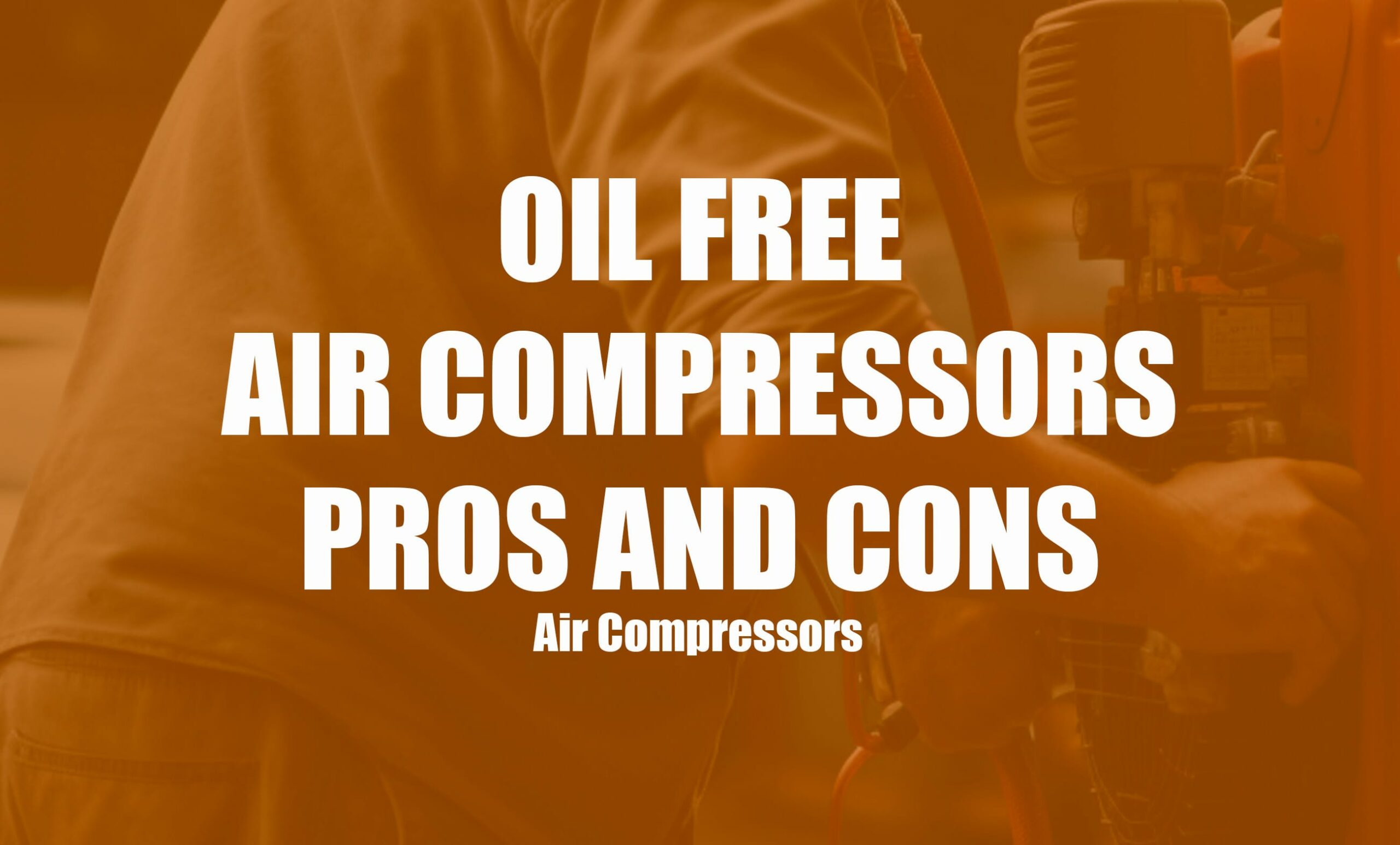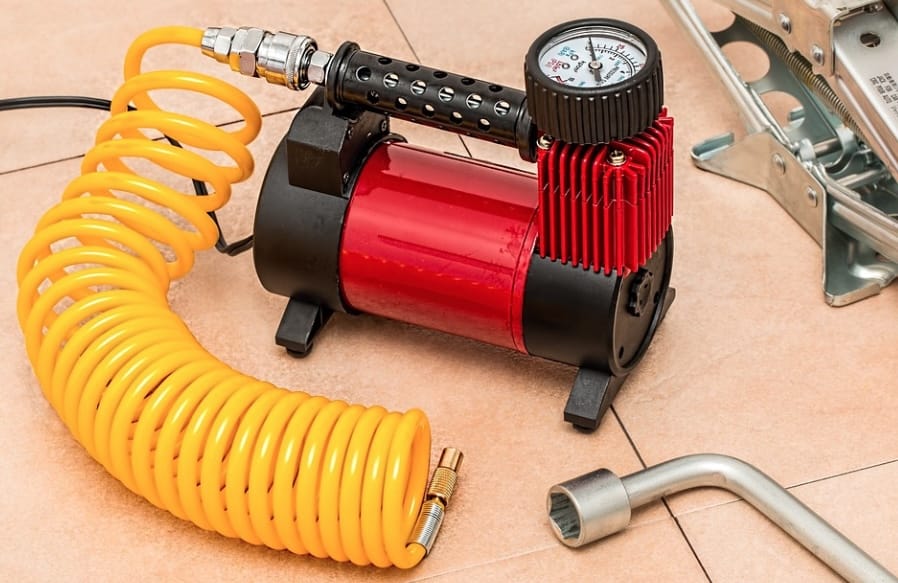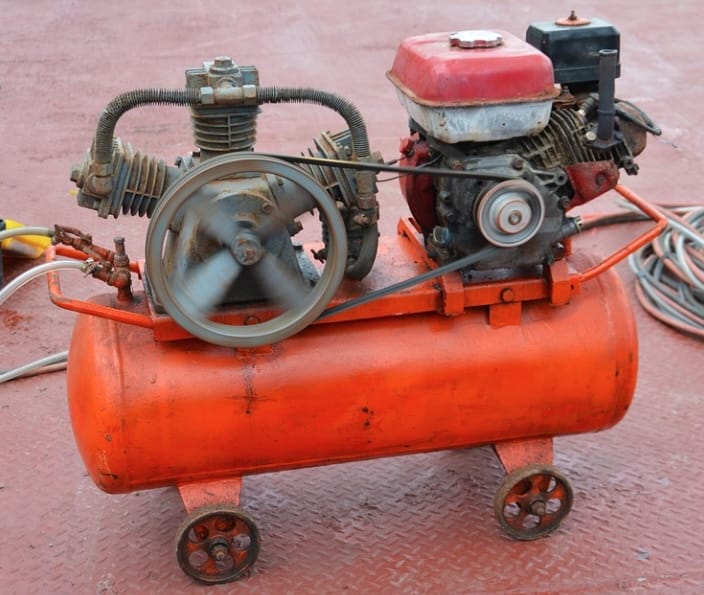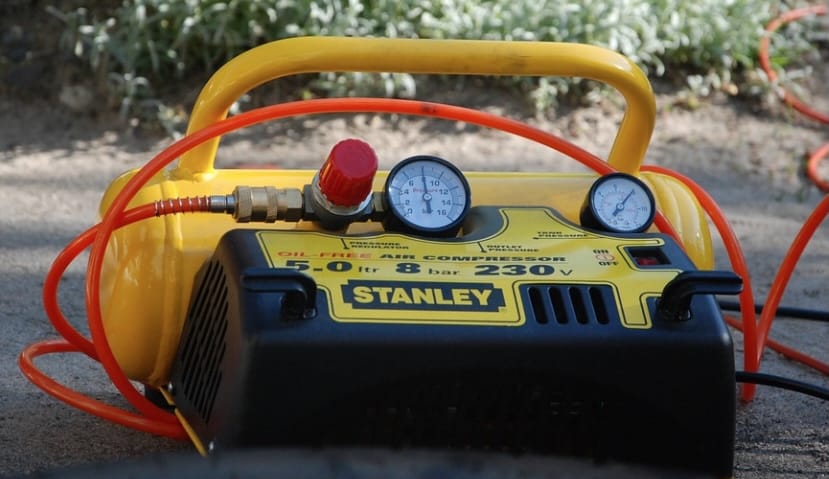It’s easy to be overwhelmed by all the options of air compressors available nowadays, especially when it comes to their oil free air compressors.
But with a little help from this guide, you’ll be able to learn the pros and cons related to this type of air compressors so you can, hopefully, make a better decision.
Through this article, you’ll be able to learn both the advantages and disadvantages of getting an oil free air compressor.
You’ll also see our best pick and some frequently asked questions that always pop up when discussing oil free air compressors.
So, let’s get started, shall we?
What Are Oil Free Air Compressors?
Okay, so you might be wondering what the deal is with oil-free air compressors.
It’s pretty simple: they’re just like regular air compressors, but without the oil.
Let me break it down for you: regular air compressors use oil to keep their internal parts running smoothly.
But with oil-free compressors, the parts are made differently so they don’t need oil to run. And because of that, they don’t need to be serviced as often.
So, in a nutshell, oil-free compressors = no oil, less maintenance.
Got it? Cool.
Oil Free Air Compressors Pros
Let’s first discuss what are the advantages of getting an oil free air compressor:
More Efficiency
So you might be wondering why efficiency is such a big deal when it comes to air compressors.
Well, think about it – the more efficient a compressor is, the less energy it uses. And who doesn’t want to save a little cash on their energy bill, right?
But it’s not just about saving money, it’s also about keeping your compressor running smoothly for longer. The less energy it uses, the less wear and tear on the machine.
Now, it’s this efficiency where oil-free compressors really shine.
Oiled air compressors require a bunch of extra equipment to keep the oil out of the compressed air.
This includes things like oil filters and oil separators. But all that extra equipment usually causes a pressure drop, meaning the compressor has to work harder to maintain the pressure it needs.
With oil-free compressors, you don’t have to worry about that.
Since they don’t use oil, they don’t need all that extra equipment. That way, the compressed air is cleaner and there’s no pressure drop. So not only do they save you money on energy, they also help you save money on maintenance.
Less Air Pollution
So, you might be wondering: what’s the big deal about a little bit of oil in the air that oiled air compressors leave?
Well, for one, it can be pretty harmful to the people working near the compressor. Oil mist can cause respiratory issues and aggravate existing conditions like asthma.
Also, it’s not just about the people working near the compressor.
Oil mist can also be harmful to the environment, and in some industries, this is a big concern.
Take the medical industry for example, where air quality is of the utmost importance. Or the restaurant industry, where even a small amount of oil mist can affect the taste and smell of food.
That’s why in these industries, it’s essential to use an oil-free compressor as they don’t leave any traces of oil in the air.
Less Maintenance Costs
As a handyman, you know how frustrating it can be to spend hundreds of dollars a month just maintaining your tools. It’s like throwing money down the drain.
But with oil-free compressors, you don’t have to worry about that.
You see, oiled air compressors are a real pain to maintain as you have to constantly change the oil and filters, and that can add up quickly.
It’s like having a never-ending cycle of expenses. Not to mention, if you don’t keep up with the maintenance, it can lead to costly repairs down the road.
But oil-free compressors? They’re a whole different story.
They don’t require oil changes or oil filter changes. Their air filter lasts longer too. This means almost no maintenance and big savings on your monthly expenses.
Less Environmental Impact
The environment is where we live and it’s important to preserve it for future generations, I believe we can all agree with that.
As a handyman, you can do your part by choosing oil-free air compressors.
These compressors don’t require oil, which means you don’t have to worry about disposing of oil and following certain instructions to take care of the environment.
Unfortunately, not everyone follows these instructions and that can lead to oil leaks and spills which can harm the environment.
So, by choosing an oil-free compressor, you’re investing in a tool that’s better for the environment and better for your own health and well-being. At least that’s how I look at it.
Oil Free Air Compressors Cons
Now, let’s get involved with the not-so-good aspects of investing your hard-earned money on an oil free air compressor:
Noisier
You might have heard that oil-free compressors can be a bit loud, and that’s true to some extent.
The reason being, the internal parts of these compressors aren’t lubricated, which can make them a bit noisier when they’re running.
But here’s the thing: this isn’t as much of a concern as it used to be.
Thanks to advancements in technology and design, modern oil-free compressors are way quieter than their older counterparts.
So, even though it might have been an issue in the past, it’s not really something to worry about these days.
Less Durable
You know how it goes, when you’re using a tool, you want it to be as durable as possible. And that’s where things get a bit tricky with oil-free air compressors.
When the internal components of an air compressor are moving, they’re rubbing against each other, creating friction.
This friction can cause the temperature inside the compressor to increase, and that can take a toll on the overall durability of the machine.
Now, oil-free compressors don’t have the same level of lubrication as regular compressors.
Their internal components are made of special materials that don’t require lubrication, which is great for reducing maintenance costs and minimizing pollution.
But, that also means that they can wear out faster because of the lack of lubrication.
Comparison Table
Here’s a quick comparison table that will show you, at a glance, the pros and cons related to getting an oil free air compressor:
| Pros | Cons | |
| Oil Free Air Compressors | – More Efficient – Cheaper to buy and maintain – More Environmental Friendly – Less Air Pollution | – Noisier – Less Durable |
Best Oil Free Air Compressor
California Air Tools 10020C-22060 Oil Free Air Compressor
Features
- Air pressure ratings: 6.40 CFM at 40 PSI & 5.30 CFM at 90 PSI
- Pump: Oil free pump
- Wheels and handle: Yes
This bad boy packs a punch with its 2HP motor that can handle even the toughest pneumatic tools, cranking out 6.40 CFM at 40 PSI and 5.30 CFM at 90 PSI.
I personally love its oil-free pump. Not only does it save you the hassle and expense of constantly lubricating and changing oil, but it’s also better for the environment since there’s no risk of polluting the air with oil mist.
And the convenience doesn’t stop there – it also comes with two universal 1/4 inch quick connectors for easy use. Plus, at just 70 dBA of noise, it’s about as loud as a vacuum cleaner, making it perfect for working in a quiet environment.
Sure, it might be a bit pricey, but when you consider all the features and benefits it offers, it’s well worth the investment.
Plus, it’s easy to move around thanks to its set of wheels and comfortable handle. And with thermal overload protection, you can rest easy knowing it won’t overheat and cause damage.
Pros
- 2HP motor that outputs 6.40 CFM at 40 PSI & 5.30 CFM at 90 PSI, being able to run most pneumatic tools
- Oil free pump that removes the need of oil lubrication to reduce maintenance cost and the risk of polluting the air
- Two universal 1/4 inch quick connector for maximum convenience
- It makes around 70 dBA of noise which is about the sound of a vacuum cleaner
- Set of wheels and comfortable handle to easily move the air compressor around
- Thermal overload protection to keep the motor from overheating enhancing protection and durability
Cons
- Kinda expensive yet a solid choice (at least in my opinion)
Frequently Asked Questions
Let’s discuss the most frequently asked questions about oil free compressors and their pros and cons so you can discover the ins and outs of these types of air compressors.
Are oil-free air compressors better?
The answer to this question will highly depend on your needs.
Oil-free air compressors are great for industries where air quality is a major concern, such as the medical and food industry.
These compressors hate the presence of oil, so you can’t have oil leaks or spills.
However, for heavy-duty industries, oiled air compressors might be a better choice. Let me explain:
The extra lubrication provided by the oil helps the moving parts run smoothly and reduces the wear and tear on the machine. This makes them a better choice for industries that require a lot of power and durability, such as construction or manufacturing.
What is the advantage of an oil-free air compressor?
When it comes to oil-free air compressors, there are a few key advantages they have over their oiled counterparts:
- They are more efficient, as they don’t require oil lubrication and therefore don’t have to waste money and do frequent oil changes
- They are cheaper to buy and maintain, as (again) they don’t require oil changes or oil filter replacements
- They are also more environmentally friendly, as there’s no risk of oil leaks or spills
How long will an oilless air compressor last?
When it comes to lifespan, oil-free air compressors may not last as long as their oiled counterparts.
An oil-free compressor’s air-end typically lasts around 50,000 hours, while an oiled compressor’s air-end can last up to 150,000 hours or more.
This is because the lubrication provided by the oil helps to reduce friction and wear on the internal components, increasing the overall lifespan of the compressor.
What jobs and industries choose oil free air compressors?
You might be wondering why some industries prefer oil-free air compressors.
Here’s the scoop:
For the medical industry, using an oil-free compressor is a no-brainer. They don’t pollute the air as much, which is key to keeping the general population healthy and safe.
In the restaurant industry, things are getting pretty strict when it comes to food safety. Regulations like the FDA’s Food Safety Modernization Act demand clean air in the manufacturing process to avoid any contamination which is why oil-free compressors are a great choice for this industry.
And for the textile industry, the last thing you want is for your final product to be stained by pollutants in the air. With an oil-free compressor, you can rest assured knowing your fabrics will stay clean and pristine.




